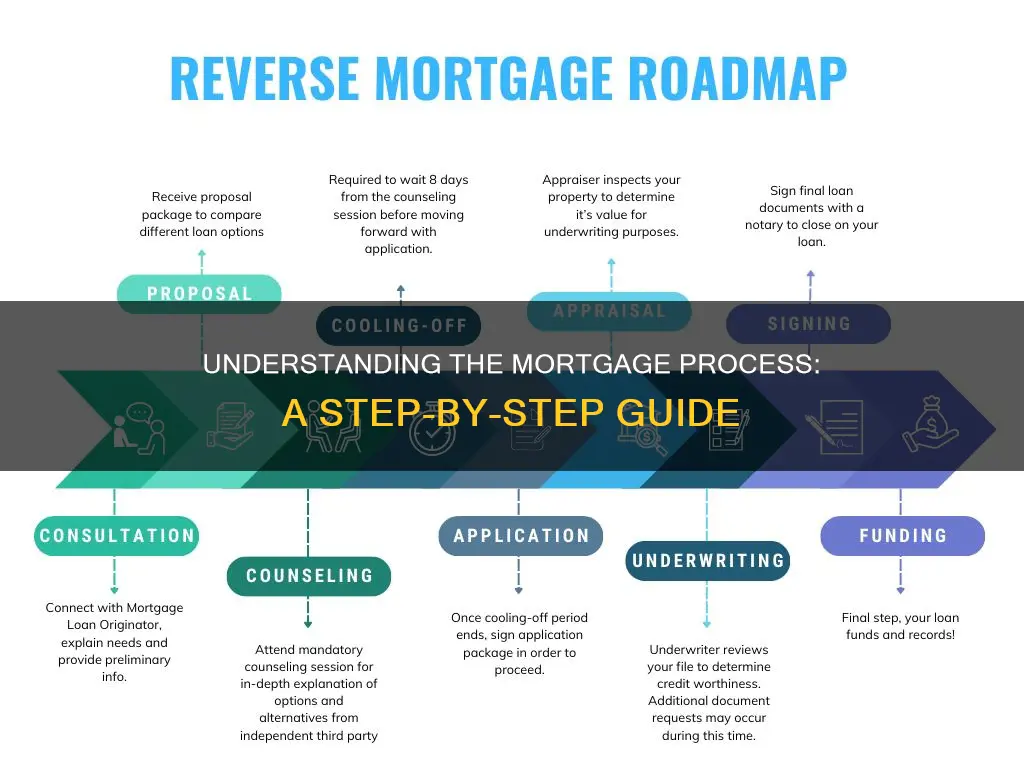
The mortgage process can be lengthy and complex, with many variables influencing the timeline. On average, the process takes around 30 to 60 days, but it can be shorter or longer depending on individual circumstances. The type of mortgage, the housing market, and the buyer's financial situation all play a role in the duration of the process. Pre-approval can speed up the process, while issues with inspections, appraisals, and legalities can cause delays. Understanding the steps involved, preparing documents, and being responsive to lender requests can help streamline the process.
What You'll Learn

The mortgage approval process can take 30-60 days
The mortgage approval process can take anywhere from 30 to 60 days, but this timeline can be influenced by a variety of factors. It is important to understand the process and the factors that can speed it up or cause delays.
The first step is to get pre-approved for a loan. This involves completing a mortgage application and providing the lender with financial information, such as income, tax returns, and credit score, for verification. The lender will then determine how much they are willing to lend you. Pre-approval can take anywhere from a day to a few weeks, with the national average being around seven to ten days.
Once you have pre-approval, you can start looking for a home. It is recommended to shop around for a mortgage lender to ensure you get the best deal on your loan. You can then make an offer on a home, which the seller can accept, reject, or counter. Negotiations at this stage typically don't last more than a few days.
After your offer is accepted, the mortgage lender will begin the underwriting process, which involves a more thorough review of your finances and the property itself. This includes an appraisal of the property, employment verification, and a review of your credit history. This process can take a couple of weeks, and any issues uncovered during this time, such as problems with the property or your financial situation, can cause delays.
The entire mortgage approval process can be completed in as little as two to three weeks if you have pre-approval and there are no delays. However, it is important to be prepared for potential delays and allow for a larger window of time for the process to be completed.
Mortgages: Empowering Buyers to Achieve Homeownership Dreams
You may want to see also

Pre-approval can streamline the process
The mortgage process can take anywhere from a few weeks to several months, depending on various factors such as the type of mortgage, the housing market, and individual circumstances. While the average time for real estate transactions with a mortgage is 60 days or less, it's not uncommon for the process to take longer, especially if there are unforeseen issues or delays.
To streamline the mortgage process, it is highly recommended to obtain pre-approval. Pre-approval is often the first step in the home-buying journey, and it involves a thorough examination of your financial situation, including your income, assets, bank accounts, credit score, and financial documents. This process helps determine your borrowing ability and gives you a clear understanding of your budget.
- Enhanced credibility and competitiveness: Pre-approval shows sellers and real estate agents that you are a serious and credible buyer. It indicates that a lender has reviewed your finances and tentatively agreed to lend you up to a certain amount. This can give you a competitive edge, especially in a busy market, as sellers often prefer buyers who have already been pre-approved.
- Clarity on budget: Pre-approval helps you understand your budget and ensures you don't waste time browsing for homes beyond your financial means. It provides valuable information about what to expect in terms of cost, allowing you to make more informed decisions.
- Streamlined loan process: With pre-approval, the lender has already received and reviewed your financial documents, which speeds up the loan process. Once you have found the home you want, your lender can quickly update your file and schedule an appraisal, keeping the process moving forward efficiently.
- Stronger negotiating power: Knowing your budget and having pre-approval strengthens your negotiating position when making an offer on a property. It demonstrates to sellers that you are likely to secure financing, which can make your offer more attractive and facilitate a smoother transaction.
- Time savings: By obtaining pre-approval early in the process, you can save time by focusing your house-hunting efforts on properties within your budget. This efficiency can be beneficial in a competitive market and help you move quickly when you find the right home.
In summary, pre-approval is a valuable step in the mortgage process as it enhances your credibility, provides budget clarity, speeds up the loan process, strengthens your negotiating position, and saves valuable time. By obtaining pre-approval, you can approach the home-buying journey with increased confidence and a competitive edge.
Gifts, Mortgages, and Parental Money: Impact and Insights
You may want to see also

Underwriting can take a few days to a few weeks
The time taken for mortgage underwriting can vary from a few days to a few weeks. This process involves a mortgage lender evaluating a borrower’s income, credit history, and the value of a property to determine whether to approve a mortgage loan and under what terms. The lender will also verify your financial information to confirm that you qualify for a loan.
The time taken for underwriting can be influenced by several factors. Firstly, the borrower's financial history can play a role. Those with more complicated financial histories, such as self-employed borrowers, may experience a longer process as the lender needs to carefully assess their financial situation. Delays can also occur if there are issues with the property, such as problems found during a home inspection or a low appraisal value.
Additionally, the lender's team structure and experience can impact the speed of underwriting. If a team of processors handles the file, there may be delays as the file moves between team members. Call centers, for example, may operate more slowly due to less experienced or overworked staff, resulting in longer processing times.
To expedite the underwriting process and avoid delays, it is recommended to prepare your documents in advance, respond promptly to any lender questions or requests, and refrain from acquiring new debt during the process. Being proactive and providing any necessary documentation as soon as possible can help ensure a smoother and quicker underwriting experience.
Money Flows: Understanding Mortgage Money Trails
You may want to see also

The property's issues can delay the process
The process of buying a house and securing a mortgage can be lengthy, and there are many variables that can impact the timeline. The average time for real estate transactions with a mortgage is 60 days or less, but it can take up to three to five months to secure a property and a home loan. The property's issues can delay the process, and it is essential to be aware of these potential issues to avoid setbacks.
One of the most common causes of delays is issues with the property's title. A title search is conducted to review public records and identify any debts or liens on the property. Liens are legal claims against the property, which can be used as collateral to pay back debts. If the seller has not cleared these debts before the sale, the buyer may be responsible for paying them unless they have purchased title insurance. Title issues can also arise if there are errors or missing information in the closing documents, which can delay the closing process.
Another common issue that can delay the mortgage process is a low home appraisal. The home appraisal determines the property's fair market value, and if the appraisal comes in lower than expected, it can impact the loan amount and lead to renegotiations with the seller. This can extend the timeline and cause delays in the closing process.
Additionally, inspection issues can also cause delays. A home inspection is crucial to identify any potential problems with the property, such as structural issues or conflicts with neighbouring properties. If the inspection reveals significant concerns, it can lead to further negotiations or even cause the buyer to back out of the sale.
Furthermore, the buyer's financial situation can also impact the timeline. If the buyer's credit score is not high enough or they have taken on additional debt during the mortgage process, it can affect their debt-to-income ratio and delay the approval of the loan. It is important for buyers to maintain financial stability and avoid major purchases or career changes during this time to prevent delays.
Mortgage Debt Proceeds: Co-Paying Strategies and Options
You may want to see also

The lender's team structure can cause delays
The mortgage process can be lengthy, and the timeline varies depending on the type of mortgage, the housing market, and other factors. On average, the mortgage approval process takes 30 to 60 days, but it can be shorter or longer depending on the situation.
One factor that can cause delays is the lender's team structure. If a team of processors handles your file, there is a potential for delays as the file moves between team members. The experience level of the lenders can also impact the speed of the process. Call centers, for example, may have lower rates, but they often have less experienced or overworked staff, resulting in longer processing times and higher turnover.
Additionally, the underwriting process, where the lender evaluates the borrower's income, credit history, and property value, can take a few days to a few weeks. This process can be influenced by the borrower's financial history. For instance, self-employed borrowers or those with complex financial histories may require more time for the lender to assess.
To avoid delays, it is recommended to prepare your documents in advance, respond promptly to lender requests, and refrain from acquiring new debt during the underwriting process. Understanding your financial situation, setting a budget, and consulting with a competent real estate agent can also help streamline the mortgage process.
Furthermore, issues with the property itself, such as problems uncovered during the home inspection or appraisal, can cause delays or even jeopardize the financing. Legal issues with the home title or deed, such as unpaid taxes or liens, are also potential challenges that may impact the timeline.
Understanding Mortgage Escrow: Accounts, Payments, and Zero Balance
You may want to see also
Frequently asked questions
The mortgage process can take anywhere from 3 weeks to 5 months, depending on the situation. The average time for real estate transactions with a mortgage is 60 days or less.
The underwriting process can take anywhere from a few days to a few weeks.
Underwriting is when a mortgage lender evaluates a borrower’s income, credit history, and the value of a property to determine whether to approve a mortgage loan and under what terms.
Delays can be caused by issues with the property, such as problems found during a home inspection, a low appraisal value, or legal issues with the home title or deed. Delays can also be caused by the buyer's financial situation, such as a low credit score or high debt-to-income ratio.
To speed up the process, prepare your documents in advance, respond to all lender questions and requests promptly, and avoid taking on new debt during the process. It is also recommended to get pre-approved for a loan before starting the home shopping process, as this can streamline the mortgage process and make it quicker.







